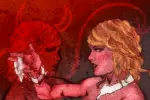In the lore of Spanish culture, the matador reveals his cape, the bull charges ferociously and the crowd cheers, wild with excitement. Although it’s unlikely that Chazwick Bundick, now Chaz Bear, and more famously recognized by his stage name, “Toro y Moi,” knew that the multilingual expression he nonsensically coined at age 15 would attach itself to his professional identity permanently, the title has since become a staple in countless music lovers’ libraries.
Bundick felt that the term “toro y,” Spanish for the “bull and,” and “moi,” meaning “me” in French, simply fit the zeitgeist of the projects he started nearly two decades ago. Nowadays, the name creates the same effect for his fans as bullfighting does in several parts of Spain and other Latin countries.
Some of the most appealing aspects of Toro y Moi’s music include the unpredictable shape-shifting that Bundick provides for his listeners, leaving them unsure what to expect from him next. After finding a niche in the chill-wave genre with the underwater, dreamy tone of his 2010 debut album, “Causers of This,” Bundick has proven that he doesn’t care about preconceived notions about him or his music.
Rather, he appreciates leaving his comfort zone, as well as experimenting with different styles and sounds that resonate on a global scale, to challenge himself both as an artist and an individual. While he continues to blur the lines between classifications, his lyrics remain thoughtful, a fact once again evident in his most recent release, “Outer Peace.”
“This might be my brand new sound / Psychedelic, oh, wow / Add an accent to your sound / Now I don’t know who I am,” Bundick sings in “Who Am I,” the track he claims most closely represents the album as a whole. The house and disco-driven electro pop, when mixed with funk and R&B undertones, create a collage of digital and futuristic harmonies that express the identity crises many people experience. Sharing both African-American and Filipino heritage, Bundick comments on the importance of not limiting ourselves to an identity based on uncontrollable factors.
Another defining premise of his latest album revolves around the use of technology, specifically for self and career-progression purposes. In this day and age, we’ve grown up hearing the promise that the internet will deliver us everything we desire and more. Depicting society’s wish to become our own bosses from the luxury of our bedrooms, the songs “Laws of the Universe” and the lead single, “Freelance,” are directed toward the younger generation of entrepreneurs and artists, who choose their own hours and pave their own ways.
Sympathizing with the mental exhaustion that frequently comes from the constant pressure to keep up with the times, Bundick sends a message about the pros and cons of working at a computer, mentioning the satisfaction of being able to reach out to loved ones through a screen, but never being able to leave work when your home becomes your office.
In “New House,” Bundick delivers his first hip-hop beat with rap elements in it, surprising audiences with his ability to provide a fresh tone to tell a story. Here he vocalizes the societal pressures to constantly upgrade our lives, singing, “I want a brand new house / Something I cannot buy / Something I can’t afford.”
In “Ordinary Pleasure” and “Monte Carlo,” Bundick reflects on the feelings of getting older and preferring the simpler things life has to offer. As someone who drives a 1988 pickup truck in real life, the musician certainly sees value in nostalgia and finds sentiment in the old fashioned.
“50-50,” which Bundick called his favorite track on the tape, refers to the skateboarding concept of having a 50-50 chance at either flying off your board or landing the move. The visual is simple, but speaks to a larger truth about the thrill and fear behind every opportunity.
During the process of developing the 30-minute long album, Bundick knew from the start that he wanted the project to have a more cheerful ring to it than his previous and more melancholy work, “Boo Boo.” He accomplishes this by using faster BPMs and sounds that feel as though they are coming out of nowhere. Seeing as Bundick himself has been more into ballads on the shorter side lately, “Outer Peace” is very ADD-friendly, with songs that are direct and concise, beginning with buoyant beats and verses the second they start playing.
The album is a welcome addition to Bundick’s already-sizable repertoire, and although it marks an increasing departure from his chillwave ways of old, “Outer Piece” is one of the most fun, danceable projects Toro y Moi has released in years.
















